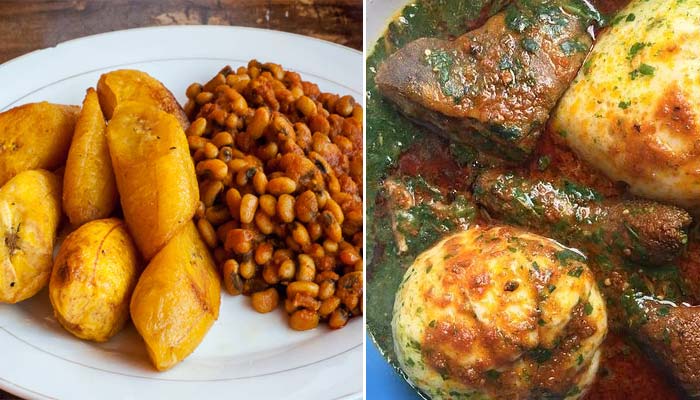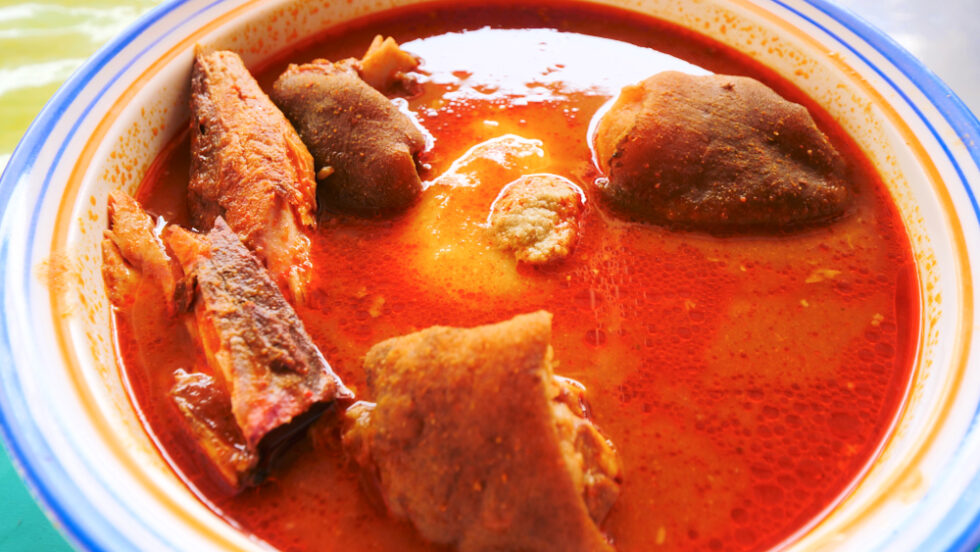Ghanaian Foods: Exploring the Rich Culinary Heritage

If you're a food enthusiast seeking to explore diverse and flavorful cuisines, look no further than Ghanaian foods. With a rich culinary heritage influenced by various cultures and regions, Ghanaian dishes offer an explosion of taste and aroma that will leave your taste buds delighted. In this article, we'll take you on a delectable journey through the flavors, textures, and traditions of Ghanaian cuisine. Get ready to tantalize your senses with mouthwatering dishes that reflect the vibrant culture and history of Ghana.
The Flavors of Ghana
Ghanaian cuisine is a celebration of flavors, and each dish is carefully crafted to deliver a harmonious blend of taste sensations. From savory and spicy to tangy and sweet, Ghanaian dishes have it all. What sets Ghanaian foods apart is the creative use of herbs and spices, which adds depth to the flavors. Whether you're savoring a hearty soup or indulging in a grilled delicacy, you'll be enchanted by the explosion of tastes on your palate.
Staple Foods in Ghana
At the heart of every Ghanaian meal are the staple foods that provide sustenance and satisfaction. Cassava, yam, and plantains take center stage in Ghanaian cuisine. These versatile ingredients are used in various forms, such as fufu, banku, and kenkey. Prepared through pounding, steaming, or boiling, these staple foods form the foundation of many traditional dishes.
Delicious Ghanaian Soups
Ghanaian soups are a culinary treasure, often served as the first course during meals. One of the most beloved soups is the groundnut soup, which boasts a creamy texture and nutty flavor. Another popular option is palm nut soup, made from palm fruits and spices, giving it a distinct taste that captivates the senses. With a medley of vegetables, meats, and spices, Ghanaian soups are true delights.
Savoring Ghanaian Stews
Ghanaian stews are a feast for both the eyes and the taste buds. Prepared with a variety of meats, fish, and vegetables, these stews are a true reflection of Ghana's diverse culinary landscape. The tantalizing aroma of simmering stews fills the air, promising a delightful experience. The blend of aromatic spices and fresh ingredients makes each stew a unique and unforgettable culinary adventure.
Grilled and Roasted Delights
When it comes to grilling and roasting, Ghanaians have mastered the art of creating succulent and flavorful dishes. Suya, a popular grilled meat delicacy, is seasoned with a special spice blend that infuses it with a burst of flavors. Kebabs, featuring a mix of marinated meats and vegetables, are grilled to perfection, making them a favorite street food option.
The Delectable Street Foods
Ghana's street food scene is a vibrant tapestry of tastes and aromas. Waakye, a beloved street food, combines rice and beans served with a spicy sauce and fried plantains. Kelewele, on the other hand, offers a unique blend of ripe plantains seasoned with ginger and spices, delivering a delightful sweet and spicy contrast. The convenience and burst of flavors in street foods make them an irresistible choice for locals and visitors alike.
Tasty Ghanaian Snacks
Ghanaian snacks and appetizers offer a delightful range of flavors and textures. Bofrot, a type of doughnut, tempts with its soft interior and slightly crunchy exterior. Kofi brokeman, a popular grilled snack made with spicy roasted plantains, appeals to those who crave a savory treat. Gari soakings, featuring cassava flakes soaked in milk and sugar, provide a sweet and satisfying snack option.
Sweet Endings: Ghanaian Desserts
Ghanaian desserts bring a sweet finale to any meal. Embracing Ghanaian desserts bring a sweet finale to any meal. Embracing the country's bountiful fruit offerings, desserts often feature fresh and tropical fruits. Mango rice pudding, a luscious blend of mangoes, rice, and creamy coconut milk, offers a refreshing and fruity delight. Coconut cake, with its moist and coconut-infused sponge, is a favorite among those with a sweet tooth. The use of natural sweeteners and locally sourced ingredients ensures that these desserts not only taste amazing but also showcase the best of Ghana's produce.
Ghanaian Beverages
Ghana's beverage culture is equally captivating, with a range of delightful options to quench your thirst. Palm wine, derived from the sap of palm trees, offers a unique and slightly tangy taste that pairs perfectly with spicy dishes. Sobolo, a vibrant hibiscus tea, is a refreshing and natural thirst-quencher, enjoyed by Ghanaians throughout the year. Whether it's a refreshing drink during hot days or a complement to a hearty meal, Ghanaian beverages offer a delightful array of flavors.
Eating Etiquette in Ghana
In Ghana, mealtimes are more than just about satisfying hunger; they are social occasions where family and friends come together to share delicious food and create lasting memories. Ghanaians value the communal aspect of meals, often eating from a shared dish. Before diving into the scrumptious spread, handwashing is a customary practice to ensure cleanliness and show respect for the food and fellow diners. So, remember to wash your hands and embrace the communal spirit when dining in Ghana.
Ghanaian Food and Celebrations
Ghanaian celebrations are incomplete without a sumptuous feast, and food plays an integral role in bringing people together. During festivals and special occasions, families and communities prepare an array of traditional dishes to mark the festivities. From jollof rice to waakye and a variety of stews and soups, the abundance of food reflects the joyful and inclusive spirit of Ghanaian celebrations.
Ghanaian Food and Health Benefits
Beyond their delectable flavors, Ghanaian foods boast a range of health benefits. The use of fresh ingredients, including a medley of vegetables and fruits, ensures a balanced and nutritious diet. Staple foods like yams and plantains provide essential nutrients and energy, while the inclusion of fish and lean meats adds valuable protein to the diet. Moreover, the moderate use of spices like ginger and turmeric in dishes offers potential health benefits, making Ghanaian cuisine not only delightful but also nourishing.
Preserving Ghana's Culinary Heritage
As with any culture's cuisine, Ghanaian culinary traditions deserve preservation and appreciation. Efforts to promote local dishes, protect indigenous ingredients, and celebrate the culinary heritage are crucial to preserving Ghana's food culture for future generations. By seeking out and savoring authentic Ghanaian foods, both locals and visitors contribute to the conservation of this diverse and flavorsome culinary legacy.
Conclusion
In conclusion, Ghanaian foods offer an extraordinary journey through the country's rich culinary heritage. From the tantalizing flavors of soups and stews to the delightful sweetness of desserts, each dish tells a story of Ghana's vibrant culture and traditions. Whether you're exploring street food delights or savoring a homemade feast, Ghanaian cuisine promises an adventure of taste and aroma that will leave you with unforgettable memories.
So, the next time you have the opportunity, don't hesitate to try some of Ghana's mouthwatering dishes. Embark on a culinary exploration and let your taste buds be captivated by the burst of flavors and textures that Ghanaian foods have to offer. You won't be disappointed!
Frequently Asked Questions (FAQs)
1. What are the staple foods in Ghanaian cuisine?
Ghanaian cuisine revolves around staple foods like cassava, yam, and plantains, which form the foundation of many traditional dishes.
2. Which Ghanaian soup is a must-try?
Groundnut soup and palm nut soup are two popular Ghanaian soups that you shouldn't miss. Both are flavorful and unique in their own way.
3. What are some popular Ghanaian street foods?
Waakye, a combination of rice and beans, and kelewele, spicy fried plantains, are among the most beloved street food options in Ghana.
4. Are Ghanaian desserts healthy?
Ghanaian desserts often feature fresh fruits and natural sweeteners, making them a relatively healthier choice for those with a sweet tooth.
5. How does food play a role in Ghanaian celebrations?
Food plays a central role in Ghanaian celebrations, with a wide array of dishes prepared to mark special occasions and bring communities together.
Boost Your Business Growth with YouTube Shorts: A Complete Guide
YouTube Shorts have rapidly emerged as a powerful tool for businesses ai...
Essential Legal Tips Every Small Business Owner Should Know
Starting and running a small business can be an exciting venture, but it...
Secrets to Creating Customer Experiences That Leave a Lasting Impression
In today’s competitive market, creating a memorable customer exper...
Transform Your Local Business with These Social Media Strategies
In today's digital age, social media is an indispensable tool for promot...
Revolutionize Your Local Business: The Must-Know Marketing Trends of 2024
The world of local business marketing is ever-evolving, with new trends ...







